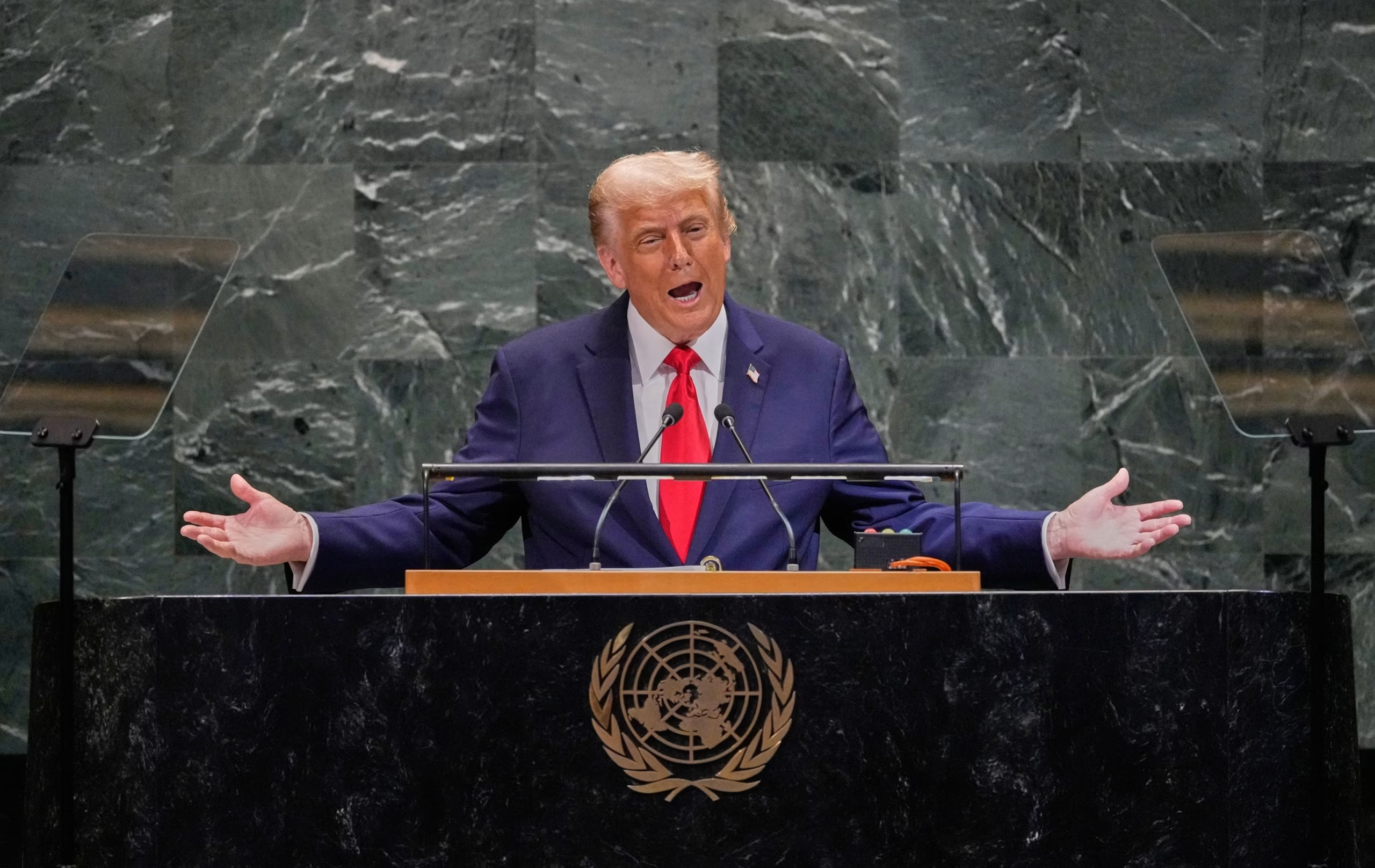President Donald Trump shocked diplomats and observers alike on September 23, 2025, when he addressed the United Nations General Assembly in New York City. His blunt warning—“your countries are going to hell”—instantly became the most quoted and debated line of the session. In a sweeping and combative speech, Trump condemned open-border policies, attacked green energy initiatives, questioned the relevance of the United Nations itself, and painted a grim picture of what he claimed was happening to nations that reject strong borders and traditional values.
A Speech That Stunned the Room
From the moment he took the podium, Trump abandoned the usual diplomatic tone that often characterizes UN addresses. Instead, he unleashed a barrage of criticisms against world governments for what he described as “failed experiments” and “suicidal policies.”
“When your prisons are filled with so-called asylum seekers who repay kindness with crime,” he said, “it is time to stop pretending. It is time to end the failed experiment of open borders. You have to end it now. Otherwise, I can tell you, your countries are going to hell.”
The remark landed like a thunderclap in the chamber, where rows of leaders, diplomats, and aides listened intently. Some nodded in agreement, while others shifted uncomfortably in their seats.
Immigration at the Core
Immigration has long been central to Trump’s political identity, and at the UN he returned to familiar themes. He praised his administration’s border enforcement, claiming that once the United States began detaining and deporting all who entered illegally, the flow of migrants stopped.
“They’re not coming anymore,” Trump boasted. “Because they know the rules have changed. We are protecting our country, and you must do the same if you want to survive.”
He linked immigration to crime, cultural erosion, and national decline, saying that countries too “politically correct” to defend themselves were watching their heritage disintegrate. “You want to be politically correct,” he warned, “and you’re destroying your heritage.”
Strikes at Climate and Energy Policies
Another major target of Trump’s speech was global climate initiatives and the rapid push toward green energy. He mocked governments that, in his view, had sacrificed economic strength for what he called “climate hysteria.”
“Your leaders are shutting down industries, putting families out of work, and leaving your countries weak,” he argued. “This so-called clean energy obsession is making nations dependent on foreign powers while destroying jobs at home. It is a scam, and it will ruin you if you don’t stop.”
For Trump, the issue was not just environmental but existential. He framed the climate agenda as part of a globalist ideology that undermines sovereignty and prosperity.
Harsh Words for the UN
In one of the most confrontational parts of his speech, Trump questioned whether the United Nations had any purpose left.
“It’s too bad that I had to do these things instead of the United Nations doing them,” he said, referring to U.S. diplomatic efforts and military actions abroad. “That being the case, what is the purpose of the United Nations?”
The remark drew murmurs across the hall, with some diplomats visibly taken aback. Trump described the UN as ineffective in preventing wars and crises, and even poked fun at technical mishaps that morning, such as a broken escalator and a malfunctioning teleprompter, as metaphors for the organization’s dysfunction.
Boasts of Achievements
Despite the combative tone, Trump took time to list what he considered his administration’s major victories. He declared that U.S. diplomacy had ended “seven unendable wars” and claimed credit for striking deals that others said were impossible. At one point, he suggested that his achievements could qualify him for a Nobel Peace Prize, though he quickly added: “What I care about is not winning prizes, it’s saving lives.”
He also highlighted American military action against drug cartels in the Caribbean, boasting that U.S. forces had destroyed smuggling boats near Venezuela. “To every terrorist thug smuggling poisonous drugs into the United States of America,” he thundered, “please be warned: we will blow you out of existence.”
A Softer Tone Behind Closed Doors
After his speech, Trump struck a very different note in a private meeting with UN Secretary General António Guterres. There, he praised the organization as a “great opportunity for peace” and insisted that the United States remained “100 percent behind the United Nations.”
“I may disagree with it sometimes,” he said, “but I am so behind it because I think the potential for peace for this institution is so great.”
The contrast between his public condemnation and private praise left many wondering whether Trump’s criticisms were meant more for domestic audiences than for the diplomats seated before him.
Reactions Around the World
Reactions to Trump’s remarks poured in from capitals across the globe.
-
European Leaders: Many bristled at being told their countries were “going to hell.” Privately, some officials said Trump’s speech was a direct attack on European immigration and climate policies. Publicly, most struck a diplomatic tone, expressing continued commitment to multilateralism.
-
Media Analysts: Commentators split sharply. Supporters said Trump delivered necessary truth, cutting through polite fictions about immigration and climate policy. Critics accused him of fearmongering, exaggeration, and undermining international cooperation.
-
Humanitarian Groups: NGOs warned that Trump’s rhetoric risked fueling xenophobia and stigmatizing migrants. They emphasized that many asylum seekers are fleeing violence, poverty, or persecution, not seeking to “destroy heritage.”
Why the Speech Matters
Trump has given many fiery addresses before, but this one stood out for several reasons:
-
Global Stage: Delivered before world leaders at the UN, his words had maximum visibility and diplomatic consequence.
-
Direct Condemnation: Instead of critiquing policies, he accused entire nations of decline and doom.
-
Timing: With wars, migration crises, and energy debates dominating international headlines, his remarks hit sensitive nerves.
-
Signals of Policy: The speech hinted at even tighter U.S. immigration measures, renewed skepticism of climate commitments, and a tougher stance toward international organizations.
Key Quotes from Trump’s UN Speech
-
“Your countries are going to hell.”
-
“It’s time to end the failed experiment of open borders.”
-
“You want to be politically correct, and you’re destroying your heritage.”
-
“Once we started detaining and deporting everyone who crossed the border … they simply stopped coming.”
-
“To every terrorist thug smuggling poisonous drugs … we will blow you out of existence.”
Looking Ahead
The fallout from Trump’s UN address will likely linger long after the session ends. Some allies may quietly recalibrate their policies, while others may push back against what they see as American overreach. Within the U.S., the speech is certain to energize Trump’s supporters, who will see it as proof of his willingness to speak hard truths that others avoid.
At the same time, critics argue that international cooperation is already fragile, and speeches like this risk deepening divides at a moment when unity is most needed.
Whether remembered as a bold warning or reckless provocation, Trump’s “going to hell” remark has already carved out a place in diplomatic history.

James Jenkins is a celebrated Pulitzer Prize-winning author whose work has reshaped the way readers think about social justice and human rights in America. Raised in Atlanta, Georgia, James grew up in a community that instilled in him both resilience and a strong sense of responsibility toward others. After studying political science and creative writing at Howard University, he worked as a journalist covering civil rights issues before dedicating himself fully to fiction. His novels are known for their sharp, empathetic portraits of marginalized communities and for weaving personal stories with broader political realities. Jenkins’s breakout novel, Shadows of Freedom, won national acclaim for its unflinching look at systemic inequality, while his more recent works explore themes of identity, resilience, and the fight for dignity in the face of oppression. Beyond his novels, James is an active public speaker, lecturing at universities and participating in nonprofit initiatives that support literacy and community empowerment. He believes that storytelling is a way to preserve history and inspire change. When not writing, James enjoys jazz music, mentoring young writers, and traveling with his family to explore cultures and stories around the world.









